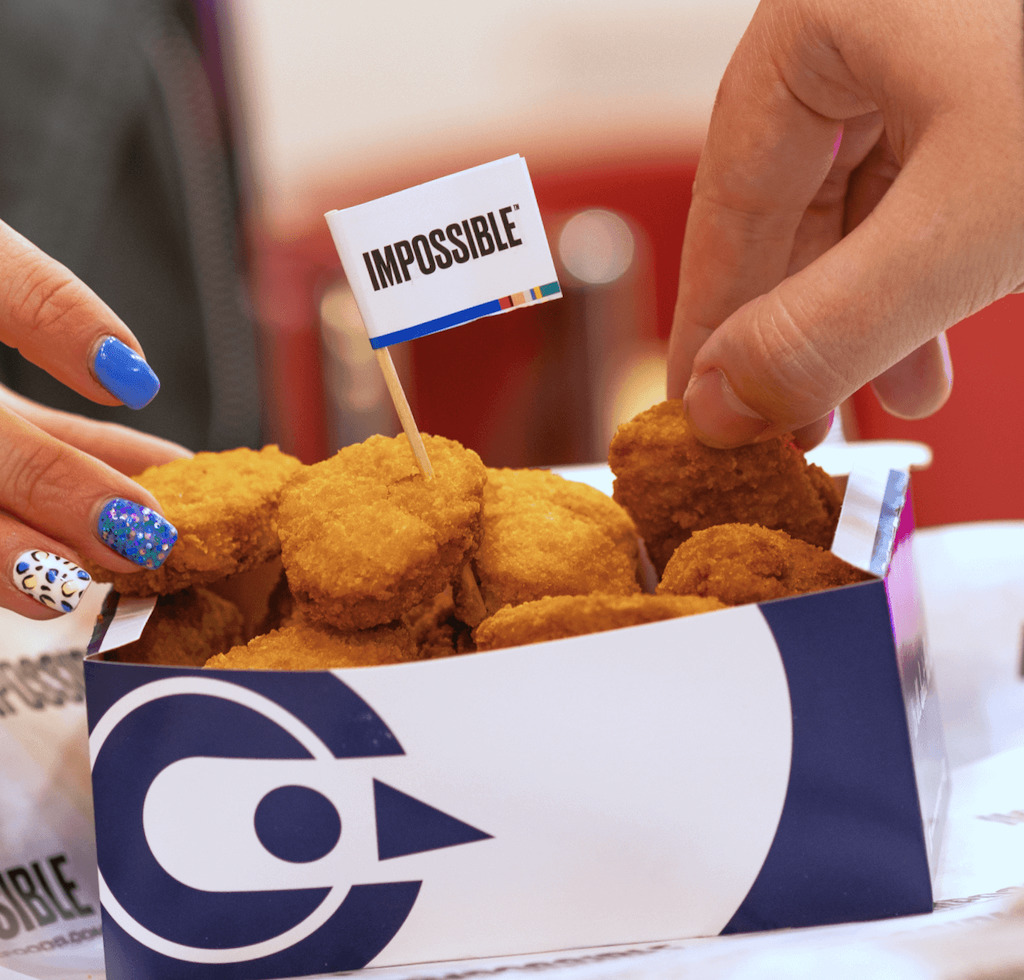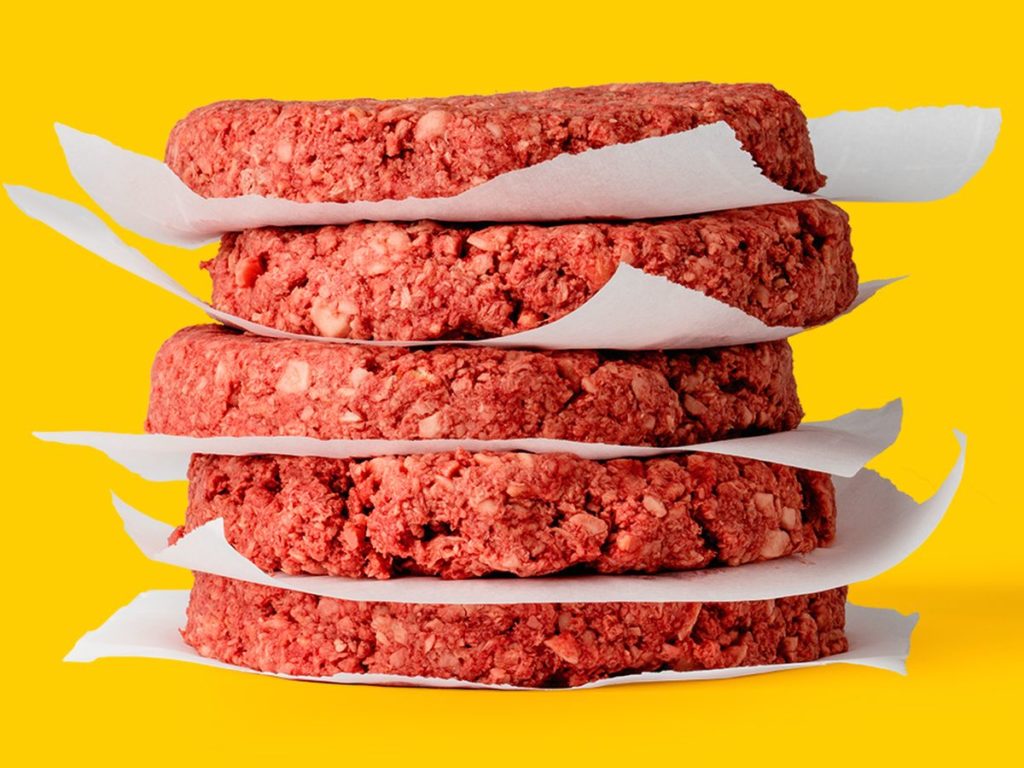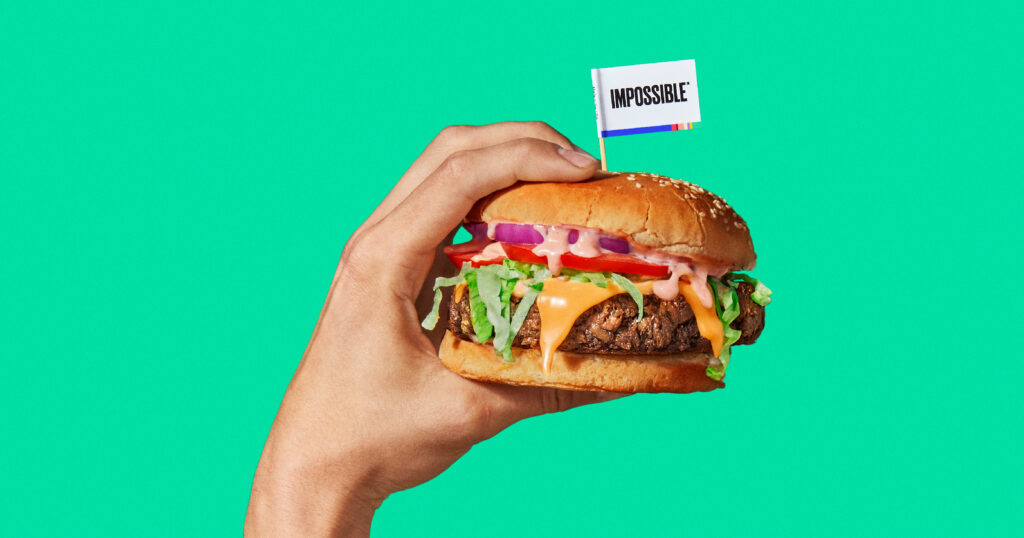Vegan Meat Leader Impossible Foods Lays Off 6% of Staff Despite Steady Growth. What’s Next?
4 Mins Read
Impossible Foods, the Bay Area vegan meat brand behind Burger King’s Impossible Whopper, says it recently laid off six percent of its workforce. Is it a sign of more cuts or more growth ahead?
According to Impossible Foods’ CEO Peter McGuinness, the recent spate of layoffs come as part of the company’s restructuring, following his appointment as CEO in April. McGuiness said in a memo to employees that the layoffs involve “roles that have become redundant to others in the organization or that are no longer aligned with our core business priorities.”
Plant-based meat sales on the decline
The news comes as reports of sales cooling for plant-based meat. According to recent data from Information Resources Inc., sales of refrigerated plant-based meat products have dropped more than ten percent in the 52 weeks ending September 4.
“Proteins that were cheaper on a price-per-pound basis did fare better,” Jonna Parker, a fresh food specialist with Information Resources Inc. told Forbes. She said the price of vegan meat may be a factor as inflation has hit consumers hard in recent months.

Despite the category decline, Impossible Foods says it saw revenue grow 70 percent in 2022. By all accounts, 2022 has, so far, been a banner year for the brand. It launched its vegan beef in New Zealand and Australia in the spring and partnered with Kroger to develop co-branded vegan meat products. Over the summer, its Burger King partnership expanded to include Impossible Chicken patties in select locations while it also made its Asian debut in Hong Kong and launched sausages and nuggets in the U.K. Impossible also ramped up its food service items following California’s announcement that it was earmarking funds to bring more plant-based options to the state’s public schools.
But is it just a matter of time before the category leader sees sales decline, too?
Experts at Deloitte say it’s not just inflation that’s got consumers pinching closed their pocketbooks when it comes to purchasing plant-based meat. A survey conducted by the organization over the summer found declining beliefs that plant-based meat is healthier and better for the environment than conventional meat. Those have historically been two of the leading reasons consumers shift to plant-based products.
“We have a lot of room to go,” McGuinness said, adding that consumers still have “low awareness” and “low understanding” about plant-based foods. “The category in and of itself has done a pretty lousy job of communicating it, and we haven’t done a great job either,” he said.
The brand’s plant-based burger has become totemic for Burger King, which recently hosted several vegan and meat-free pop-ups around the world, as well as expanded its Impossible offerings in the U.S. But other launches, like Impossible’s recent sausage addition to the Cracker Barrel menu, earned the brand—and the vegan category—backlash.
A Facebook post on the Cracker Barrel announcement saw more than 11,000 comments, many of which accused the rest-stop chain of being “woke” for adding the vegan sausage option.
An Impossible Foods spokesperson told Green Queen that “contrary to reports about the performance of the plant-based meat category and a number of companies within it, we’re seeing hyper growth, with over 60% year-over-year sales growth in retail alone. Earlier this week we proactively made some organizational changes that strengthen our company and establish clear supply and demand functions to position us for our next phase of expansion. As a result, some roles were eliminated, but we’re continuing to actively recruit for key positions that will enable our continued growth.”

The new layoffs by Impossible Foods also come as JBS USA announced it was shutting down its plant-based meat business, Planterra. Canada’s Maple Leaf Foods’ Greenleaf Foods also recently cut employees.
Beyond Meat, Impossible Foods’ chief competitor, has also recently announced cuts—the latest in a string of struggles. It recently cut its sales projections for the year from $560 million to $620 million down to $470 million to $520 million. McDonald’s, which had been testing the Beyond-based McPlant burger at more than 600 U.S. locations, recently pulled the test off the menu. Unlike the success of the Impossible Whopper for Burger King, McDonald’s says it struggled to meet sales projections and customer enthusiasm stateside for the burger. That’s not the case in other markets, like the Netherlands, where McDonald’s just made the McPlant a permanent menu item.
A possible future
But Impossible says it’s seeing good cash positions, solid balance sheets, and growing at 65 to 70 percent. It has also begun accelerating its global expansion and new product offerings.
“[W]e still need to prioritize the projects and initiatives that will best fuel our business and mission as we prepare for our next phase of growth,” McGuinness told Impossible Foods’ employees in a recent memo announcing the layoffs. McGuinness says it’s part of the company’s planned “hypergrowth.”
That growth may come via founder Pat Brown who left the CEO position in April to become Chief Visionary Officer, moving McGuinness from COO to replace him as CEO. Last month, Brown announced he was leaving that position, too, in order to helm a new venture—a research-focused spinoff currently dubbed Impossible Labs—which is expected to focus on the “transformative innovation that will propel Impossible Foods to achieve our mission.”
Lead image courtesy Impossible Foods



